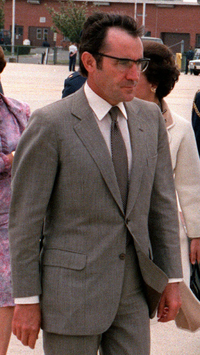António Ramalho Eanes
|
His Excellency António Ramalho Eanes GColL GCL GColTE CavA |
|
|---|---|
 |
|
| 16th President of Portugal | |
|
In office 14 July 1976 – 9 March 1986 |
|
| Prime Minister |
José Pinheiro de Azevedo Vasco Almeida e Costa Mário Soares Alfredo Nobre da Costa Carlos Mota Pinto Maria de Lourdes Pintasilgo Francisco Sá Carneiro Diogo Freitas do Amaral Francisco Pinto Balsemão Aníbal Cavaco Silva |
| Preceded by | Francisco da Costa Gomes |
| Succeeded by | Mário Soares |
| President of the Revolution Council | |
|
In office 14 July 1976 – 30 September 1982 |
|
| Preceded by | Francisco da Costa Gomes |
| Succeeded by | Position abolished |
| Chief of the Armed Forces General Staff | |
|
In office 14 July 1976 – 16 February 1981 |
|
| Preceded by | Francisco da Costa Gomes |
| Succeeded by | Nuno de Melo Egídio |
| Personal details | |
| Born |
António dos Santos Ramalho Eanes 25 January 1935 Louriçal do Campo, Castelo Branco, Portugal |
| Political party | Independent |
| Other political affiliations |
Democratic Renewal Party (1986–87) |
| Spouse(s) | Manuela Neto Portugal (m. 1970) |
| Children | Manuel António Miguel |
| Alma mater | Portuguese Military Academy |
| Profession | Army officer |
| Religion | Roman Catholicism |
| Signature | |
| Military service | |
| Service/branch | Portuguese Army |
| Years of service | 1952–1986 |
| Rank | General |
| Battles/wars | Colonial War |
António dos Santos Ramalho Eanes, GColL GCL GColTE CavA (Portuguese pronunciation: [ɐ̃ˈtɔniu ʁɐˈmaʎu iˈɐnɨʃ]; born 25 January 1935) is a Portuguese general and politician who was the 16th President of Portugal from 1976 to 1986.
Born at Alcains, Castelo Branco, he is the son of António dos Santos Eanes, a general contractor, and wife Maria do Rosário Ramalho.
After a long military career in the Portuguese Colonial Wars, he was stationed in Portuguese Angola when the 25 April revolution of 1974 took place. He joined the Movimento das Forças Armadas (MFA or Armed Forces Movement) and after returning to Portugal, he was made president of RTP (Portuguese public television). He ordered the military operations against the pro-communist radical faction of the MFA on 25 November 1975, an event known as the 25 de Novembro, ending that year's "hot summer" (Verão quente).
In 1976 he was elected President of Portugal. At the end of 1980 he was re-elected, serving until February 1986. After his presidency, he headed the Democratic Renewal Party (Portuguese: Partido Renovador Democrático), resigning in 1987.
...
Wikipedia
